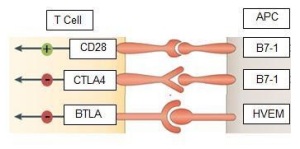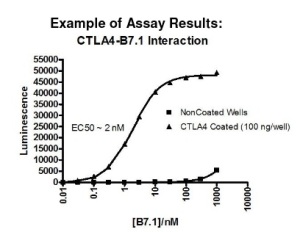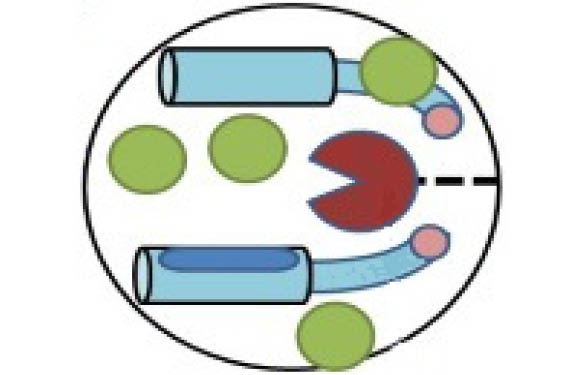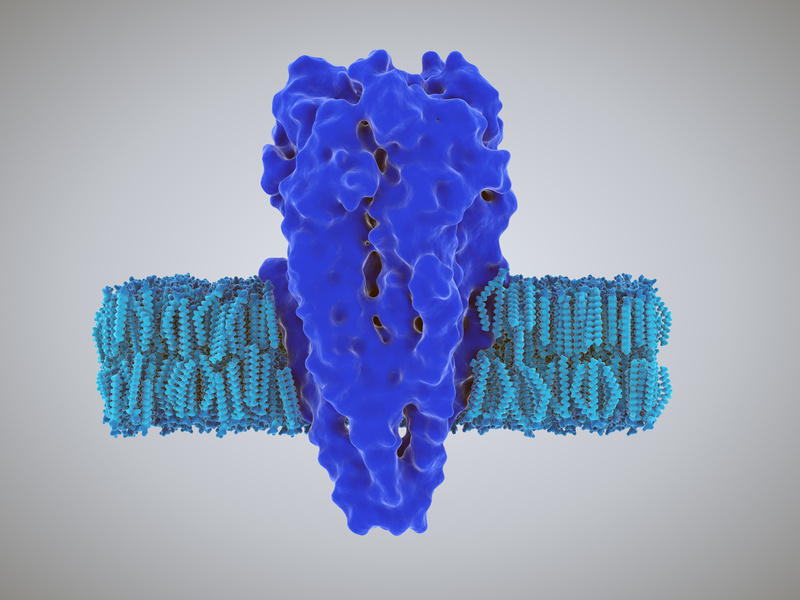The treatment of diseases by inducing, enhancing, or surpressing an immune response is referred to as Immunotherapy. T-cell activation and inactivation requires the coordination of various co-inhibitory and co-stimulatory signals and most immunotherapies modulate these signals.
Therapeutic manipulation of immunopathways has lead to promising clinical results for the treatment of a number of diseases such as cancer, autoimmune diseases and inflammatory diseases. Research in this field is rapidly evolving as scientists seek to identify the next generation of therapies.
In the first post of a series of three, I will describe the B7-1 : CD28 and B7-1 : CTLA4 pathways and summarize the portfolio of tools currently available to researchers to investigate these pathways. In fact, these are the first kits on the market to screen for inhibitors of these pathways.

B7-1 / CD28 and B7-1 / CTLA4 Pathways – Therapeutic perspectives in cancer and immune disorders
Activation of T-cells requires binding of the T-cell receptor to the Major Histocompatibility Complex (MHC) antigen. However, MHC binding itself is insufficient for producing a T cell response. A second co-stimulatory signal is required. This involves a protein called B7 (B7-1 (CD80) or B7-2 (CD86)) on the Antigen Presenting Cell (APC) surface.
B7 can bind to and activate T-cells through the CD28 antigen. However, B7 also can bind to another surface protein called CTLA4. CTLA4 has an opposite effect by blocks T-cell activation. Thus the CD28 and CTLA4 pathways are involved in a complex balancing act to maintain immunologic homeostasis.
Efforts to develop new anti-cancer treatments have targeted the CD28 and CTLA4 signaling pathways. Since the CTLA4 pathway lowers T-cell responsiveness, anti-tumor immunity can be greatly enhanced by blocking the CTLA4 signal. Mice immunized with antibody against CTLA4 display a dramatic resistance to tumor challenge and, in some cases, are able to clear established tumors. Antagonistic antibodies against CTLA4 received FDA approval for melanoma (the first immune checkpoint blockade therapy), and studies for additional CTLA4 antagonists are the focus of many anti-cancer drug discovery programs.
On the other hand, shutting down the immune response can be important in autoimmune diseases and other inflammatory disorders caused by excessive T-cell activation. Agonists of CTLA4 are being studied for their potential therapeutic value in Rheumatoid Arthritis (FDA approved), Psoriasis, and Graft rejection (approved). Similarly, blockade of CD28 is also effective at stopping T-cell activation, and the CD28 pathway is the target of a number of new approaches to treat Lupus, Arthritis, and Immune tolerance in transplantation.
The most advanced B7-1 / CD28 and B7-1 / CTLA4 screening reagents
These new therapeutical advances highlight the importance of reliable R&D tools in Drug discovery approaches and translation medicine programs. Access to robust research reagents covering the needs of Drug discoverers from target validation to screening (HTS or secondary), or even DMPK studies, is crucial. I have made a selection of some of the latest releases for scientists interested in B7-1 / CD28 and B7-1 / CTLA4 pathways.
#1 – CD28 – a receptor for the B7 antigen
CD28 (Id. nr 71113) is a receptor for B7.1 (CD80) and B7.2 (CD86). Upon activation by Toll-like Receptor ligands, CD80 expression is up-regulated in APCs.
#2 – CTLA4 receptor or CD152
CTLA4 (CD152) (Id. nr 71149) serves as a receptor down-regulating the immune system. It is found on T-cells leading the cellular immune response on antigens. By stimulating CD28 the T-cell attack can be turned on. It can be turned off by stimulating CTLA4.
#3 – B7-related ligand
B7-1 (CD80) is a protein located on activated monocytes and B cells. It has a co-stimulatory effect on T cell activation and survival. It serves as the ligand for both CD28 and CTLA4.
This B7-1 active protein can be found either under a non-conjugated format (Id. nr 71125) or Biotinylated (Id. nr 71114).
B7-2 (CD86) (Id. nr 71150) is a protein which is expressed in antigen-presenting cells. It is necessary for T cell activation and survival. As B7-1 it serves as the ligand for both CD28 and CTLA4.
Ready-to-use B7-1 / CD28 and B7-1 / CTLA4 screening assay kits

Recently, BPS Biosciences have released 2 unique ready-to-use assay kits to screen and profile inhibitors for the CTLA4 / B7-1 and CD28 / B7-1 signaling pathways (CTLA4:B7-1 Inhibitor (Cat. nr 72009) and CD28:B7-1[Biotinylated] Inhibitor Screening Assay Kits (Cat. nr 72007) respectively). These 96-well format assay kits come with biotinylated B7-1, purified CTLA4 or purified CD28, streptavidin labeled HRP and assay buffer sufficient for 100 binding reactions.
Looking for B7 / CD28 / CTLA4 testings?
Choosing the right reagents or screening kits to raise the value of your compounds of interest by looking to B7-1 / CD28 and B7-1 / CTLA4 pathways can be challenging.
The research tools reviewed in this first post (of a series of 3 posts dedicated to Immunotherapy screening) will definitely help you there. Otherwise, you can simply contact me with the form below.
[contact-form to=’Ali.el.baya@tebu-bio.com’ subject=’I am interested in Immunotherapy related screening products’][contact-field label=’Name’ type=’name’ required=’1’/][contact-field label=’Email’ type=’email’ required=’1’/][contact-field label=’Comment’ type=’textarea’ required=’1’/][/contact-form]
Subsequent Immunotherapy Screening posts on the blog “being bio-reactive”:



